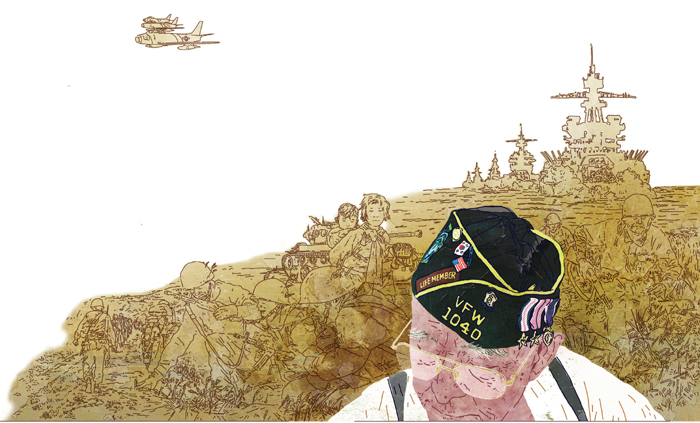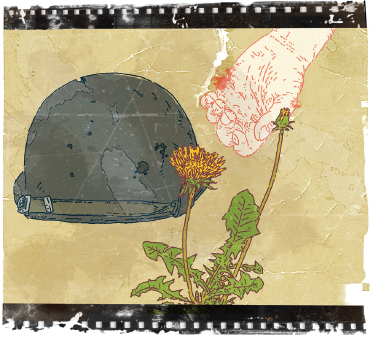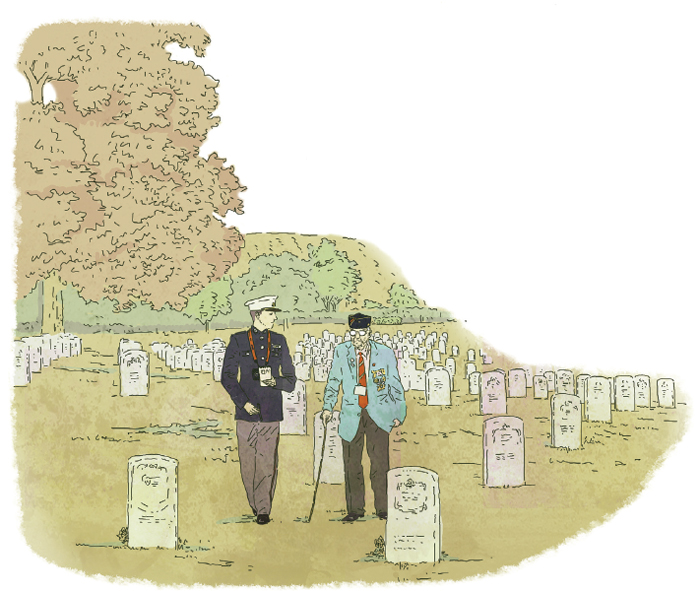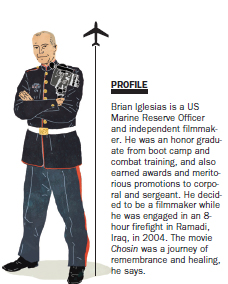View this article in another language
- 한국어
- English
- 日本語
- 中文
- العربية
- Español
- Français
- Deutsch
- Pусский
- Tiếng Việt
- Indonesian
In the winter of 1950, at the height of the “forgotten war,” 15,000 United States soldiers and marines found themselves surrounded by an overwhelming force of communist Chinese soldiers in the frozen mountains of North Korea. After 60 years of silence, the men who survived are telling their stories.
Chosin is the first-ever documentary on the Chosin Reservoir Campaign. Presented in high definition video (HD), the stories of our veterans are supplemented with rare black-and-white and color archival footage gathered from hundreds of hours of research. These first-hand accounts of the battle, combined with footage never before seen by most Americans, creates a visceral, emotionally charged experience unlike that provided by any other contemporary war documentary.

The veterans of Chosin take us on a journey back to towering mountains stained with blackened, blood-covered snow. Most of them are just kids —18 or 19-years-old — and they are outnumbered and cut off behind enemy lines. As the sun goes down each night, bugles and war-cries echo through the mountains, followed by massive human wave attacks lasting until dawn. Subzero temperatures render weapons inoperable and fighting devolves into terrifying nights of savage hand-to-hand combat. Unable to dig into the frozen ground, the Marines build parapets out of dead bodies in order to withstand each night’s onslaught. Despite overwhelming odds, the men never lose faith in each other. They refuse to surrender. Instead, the men fight their way to freedom through 125 kilometers of unforgiving, mountainous terrain and ultimately save the lives of 98,000 civilian refugees.
Following their unbelievable journey, the survivors then embark on a lonely homecoming. America is enjoying newfound wealth and relative peace after World War II. The country has lost its taste for war and has no concern for the returning veterans of a “police action.” Surrounded by friends and family who are unable to relate to their combat experiences, our veterans make an uneasy adjustment to civilian life, quietly bearing the burden of physical and emotional scars that they will carry for the rest of their lives. After 60 years of silence, the men express their pride in contributing to the freedom of the South Korea, their grief for their fallen brothers, and their hope that the Korean War will not be lost in the pages of history as “the forgotten war.”

Chosin has been a dream project of mine since learning about the battle while in enlisted boot camp at Parris Island in 1995. I initially had an academic approach in mind until I had experienced intense combat as an Infantry Platoon Commander during two tours in Iraq. My second tour in Iraq had a significant impact on me and changed my outlook for my first film. Using my own combat experience to shape the film, I made the decision to focus on the human element aspect of going to war, rather than the academic viewpoint.
I don’t remember specific dates or tactics, rather I am left with a sharp recollection of the emotions, the sights, the sounds and the smells of war. My experience also left me with the lasting impression that although I witnessed dramatic feats of sacrifice and heroism, war is not a John Wayne movie. My focus was to tell the amazing story of Chosin from the viewpoint of what it was like to be on the ground, fighting for your life and the life of your buddies. Being a combat Marine has given me an unprecedented access to these stories. What you will find here is a unique and unmatched look into the spirit of a combat veteran.
In January 2009, a mutual friend introduced me to Anton. We discovered that we had both fought in the same city in Iraq: Ramadi, one of Iraq’s most violent and heavily contested areas. There was an instant bond and trust in one another. I had written a treatment for Chosin and shared the idea with Anton. We teamed up, and just 30 days later we began shooting. The film had no financial support besides our own personal savings, credit cards and a few cashed-in retirement accounts, but we were armed with faith in our abilities and a passion for the story.
Earning the title of “Marine” means inheriting the legacy and reputation forged in sacrifice by the Marines who have gone before. The Chosin Reservoir Campaign is taught to every single recruit at boot camp, along with Belleau Wood and Iwo Jima, as one of the seminal battles of the Marine Corps’ proud history. During our research, we discovered that not only had there never been a documentary made about Chosin, but nobody, not even the Marine Corps, had archived or filmed first-person accounts of the battle. The men who survived Chosin were either gone or in their twilight years, and we realized that this revered piece of our heritage would be lost forever unless we took action.

We hired other veterans, graduates of the Wounded Marine Careers Foundation (www.woundedmarinecareers.org), a program that takes disabled Iraq and Afghanistan combat veterans and trains them for careers in media. We reached out to veterans’ organizations across the country, to include the Veterans of Foreign Wars, American Legion, and Marine Corps League, and they all provided us locations to film and places to sleep (along with a few cold beers). The Chosin team spent eight months on the road living out of a van and eating military rations in order to collect the stories from 185 Korean War veterans in 27 cities across the US. As fellow combat veterans, we forged a unique connection with the men we interviewed.

We were proud to give them a gift 60 years overdue: An environment where they felt comfortable unburdening themselves of the intimately sad, horrific, funny and triumphant moments from the most defining experience of their lives. Time and time again, these men told us stories that they had never told anyone ... not their wives, their children or their closest friends.
As the men of Chosin fade into history, their story fades with them. Many men we attempted to contact during production had passed away just weeks before our phone calls. Already, we have lost one of the veterans we had the privilege of interviewing. The importance of honoring these heroes during their lifetime is the driving force behind Chosin’s very intimate and human story of triumph and tragedy.
By Brian Iglesias
Illustrations by Jo Seung-yeon
Chosin is the first-ever documentary on the Chosin Reservoir Campaign. Presented in high definition video (HD), the stories of our veterans are supplemented with rare black-and-white and color archival footage gathered from hundreds of hours of research. These first-hand accounts of the battle, combined with footage never before seen by most Americans, creates a visceral, emotionally charged experience unlike that provided by any other contemporary war documentary.

The veterans of Chosin take us on a journey back to towering mountains stained with blackened, blood-covered snow. Most of them are just kids —18 or 19-years-old — and they are outnumbered and cut off behind enemy lines. As the sun goes down each night, bugles and war-cries echo through the mountains, followed by massive human wave attacks lasting until dawn. Subzero temperatures render weapons inoperable and fighting devolves into terrifying nights of savage hand-to-hand combat. Unable to dig into the frozen ground, the Marines build parapets out of dead bodies in order to withstand each night’s onslaught. Despite overwhelming odds, the men never lose faith in each other. They refuse to surrender. Instead, the men fight their way to freedom through 125 kilometers of unforgiving, mountainous terrain and ultimately save the lives of 98,000 civilian refugees.
Following their unbelievable journey, the survivors then embark on a lonely homecoming. America is enjoying newfound wealth and relative peace after World War II. The country has lost its taste for war and has no concern for the returning veterans of a “police action.” Surrounded by friends and family who are unable to relate to their combat experiences, our veterans make an uneasy adjustment to civilian life, quietly bearing the burden of physical and emotional scars that they will carry for the rest of their lives. After 60 years of silence, the men express their pride in contributing to the freedom of the South Korea, their grief for their fallen brothers, and their hope that the Korean War will not be lost in the pages of history as “the forgotten war.”

Chosin has been a dream project of mine since learning about the battle while in enlisted boot camp at Parris Island in 1995. I initially had an academic approach in mind until I had experienced intense combat as an Infantry Platoon Commander during two tours in Iraq. My second tour in Iraq had a significant impact on me and changed my outlook for my first film. Using my own combat experience to shape the film, I made the decision to focus on the human element aspect of going to war, rather than the academic viewpoint.
I don’t remember specific dates or tactics, rather I am left with a sharp recollection of the emotions, the sights, the sounds and the smells of war. My experience also left me with the lasting impression that although I witnessed dramatic feats of sacrifice and heroism, war is not a John Wayne movie. My focus was to tell the amazing story of Chosin from the viewpoint of what it was like to be on the ground, fighting for your life and the life of your buddies. Being a combat Marine has given me an unprecedented access to these stories. What you will find here is a unique and unmatched look into the spirit of a combat veteran.
In January 2009, a mutual friend introduced me to Anton. We discovered that we had both fought in the same city in Iraq: Ramadi, one of Iraq’s most violent and heavily contested areas. There was an instant bond and trust in one another. I had written a treatment for Chosin and shared the idea with Anton. We teamed up, and just 30 days later we began shooting. The film had no financial support besides our own personal savings, credit cards and a few cashed-in retirement accounts, but we were armed with faith in our abilities and a passion for the story.
Earning the title of “Marine” means inheriting the legacy and reputation forged in sacrifice by the Marines who have gone before. The Chosin Reservoir Campaign is taught to every single recruit at boot camp, along with Belleau Wood and Iwo Jima, as one of the seminal battles of the Marine Corps’ proud history. During our research, we discovered that not only had there never been a documentary made about Chosin, but nobody, not even the Marine Corps, had archived or filmed first-person accounts of the battle. The men who survived Chosin were either gone or in their twilight years, and we realized that this revered piece of our heritage would be lost forever unless we took action.

We hired other veterans, graduates of the Wounded Marine Careers Foundation (www.woundedmarinecareers.org), a program that takes disabled Iraq and Afghanistan combat veterans and trains them for careers in media. We reached out to veterans’ organizations across the country, to include the Veterans of Foreign Wars, American Legion, and Marine Corps League, and they all provided us locations to film and places to sleep (along with a few cold beers). The Chosin team spent eight months on the road living out of a van and eating military rations in order to collect the stories from 185 Korean War veterans in 27 cities across the US. As fellow combat veterans, we forged a unique connection with the men we interviewed.

We were proud to give them a gift 60 years overdue: An environment where they felt comfortable unburdening themselves of the intimately sad, horrific, funny and triumphant moments from the most defining experience of their lives. Time and time again, these men told us stories that they had never told anyone ... not their wives, their children or their closest friends.
As the men of Chosin fade into history, their story fades with them. Many men we attempted to contact during production had passed away just weeks before our phone calls. Already, we have lost one of the veterans we had the privilege of interviewing. The importance of honoring these heroes during their lifetime is the driving force behind Chosin’s very intimate and human story of triumph and tragedy.
By Brian Iglesias
Illustrations by Jo Seung-yeon